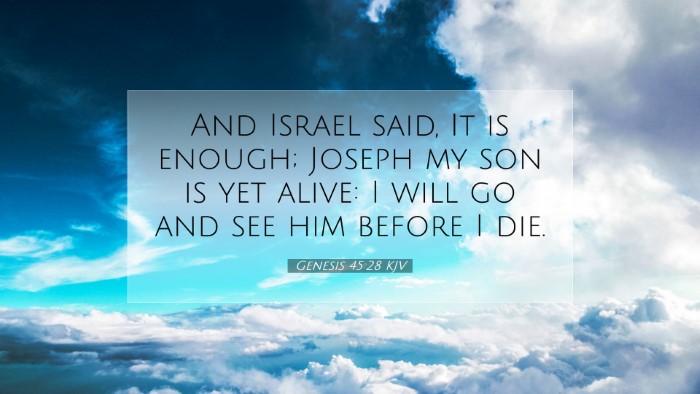Commentary on Genesis 45:28
Genesis 45:28 states: "And Israel said, It is enough; Joseph my son is yet alive: I will go and see him before I die." This verse encapsulates a pivotal moment of revelation and reunion in the life of Jacob (Israel) as he discovers that his long-lost son, Joseph, is alive. The emotional depth and theological implications set forth in this verse warrant an extensive exploration through the lens of various public domain commentaries.
1. Contextual Background
To fully appreciate this verse, one must consider the narrative context. Before this momentous declaration, Jacob had been led to believe that Joseph had died, a deception engineered by his other sons. The emotional turmoil and grief he experienced were profound, and the announcement of Joseph’s survival brought a flood of emotions, transforming despair into hope.
2. Commentary Insights
2.1 Matthew Henry’s Commentary
Matthew Henry emphasizes the moment as a culmination of divine providence, where Jacob’s sorrow turns to joy. He expresses that Jacob’s acknowledgment of Joseph being alive signifies not only familial reunion but also God’s unfathomable mercy. In Henry's view, Jacob’s reaction, "It is enough," reflects contentment and relief—a testament to God’s faithfulness amidst trial.
2.2 Albert Barnes’ Notes on the Bible
Albert Barnes provides a thorough analysis of Jacob's exclamation. He points out that the phrase "It is enough" signals Jacob's weariness from grief, contrasting the burdens he bore for years with the sudden uplift of hope. Barnes notes that this moment illustrates a common biblical theme: God often fulfills His promises in astonishing ways, reaffirming His providence in the lives of His chosen people.
2.3 Adam Clarke’s Commentary
Adam Clarke offers a rich examination of Jacob's emotional state. He views this passage as an instance where Jacob’s faith is reaffirmed; he is finally able to perceive the hand of God in his family’s trials. Clarke asserts that the reunion with Joseph represents a restoration of family cohesion and divine promise. Jacob’s decision to journey to see Joseph also signifies an act of obedience to God’s leading.
3. Theological Themes
- Reunion and Restoration: The concept of restoration is deeply embedded in this passage, as it highlights God’s ability to bring back what was thought lost.
- Divine Providence: This moment illustrates the overarching theme of God's sovereign plan, where He orchestrates events for His purposes, often beyond human comprehension.
- Hope amidst Despair: Jacob’s journey from mourning to hope serves as a crucial reminder of the transformative power of faith in God’s promises.
4. Practical Applications
For pastors and theologians, Genesis 45:28 provides rich material for preaching and teaching. The narrative underscores the importance of patience and faith in God during times of uncertainty. This passage can inspire congregations to embrace hope, reminding them that God can restore their brokenness, much like He did with Jacob and Joseph.
Students and scholars can delve deeper into the cultural and historical context of this passage, exploring the implications of family reconciliation and the significance of lineage in the biblical narrative. The emotional dynamics presented in the interaction between Jacob and Joseph open up avenues for psychological and socio-cultural analysis.
5. Concluding Thoughts
In conclusion, Genesis 45:28 is not merely a statement of a father’s joy but encapsulates profound truths about God’s providential care, the importance of family, and the hope that can arise from despair. Through the insights of Matthew Henry, Albert Barnes, and Adam Clarke, we see a multifaceted understanding of this scripture, encouraging believers to trust in God’s divine plan and to embrace the joy of restoration in their lives.


